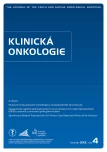-
Články
- Časopisy
- Kurzy
- Témy
- Kongresy
- Videa
- Podcasty
Oncology in Images
Giant Metastatic Testicular Tumor
Authors: P. Szturz; O. Bednařík; Dagmar Brančíková
; Z. Mechl; J. Mayer
Authors place of work: Department of Internal Medicine, Hematology and Oncology, University Hospital Brno and Masaryk University, School of Medicine
Published in the journal: Klin Onkol 2013; 26(4): 298
Category: Různé
Obdrženo: 25. 6. 2013
A 53‑year - old male was referred to a surgery emergency department for a suspected incarcerated inguinal hernia. Developing slowly over a period of one year, the physical examination showed a tough, right - inguinal mass (30 by 15 by 15 cm) with mild tenderness to palpation and erythematous overlying skin (Fig. 1). Furthermore, right lower extremity edema and hemiplegia on the opposite side were evident. With a general cachectic appearance (BMI = 18.9) and lethargy, the patient’s other medical history was remarkable only for a smoking addiction. Laboratory investigations noted elevations of lactate dehydrogenase (46.47 ukat/ L, normal range: 2.25 – 3.75 U/ L), uric acid (610 umol/ L, normal range: 202 – 417 umol/ L), alkaline phosphatase (6.83 ukat/ L, normal range: 0.67 – 2.15 ukat/ L) and C - reactive protein (52.6 mg/ L, normal range: 0 – 5 mg/ L). Abdominal ultrasonography revealed a tumorous infiltration of the right scrotum and pelvic area with parailiac lymphadenopathy. The pathological finding of a biopsied specimen was consistent with classical seminoma. Brain magnetic resonance imaging identified possible metastatic spread in the right basal ganglia, explaining the neurological symptomatology. The patient was not eligible for surgery and due to his poor performance status (Karnofsky score 30), he was indicated for chemotherapy in reduced dosage, which led to improved nutrition, amelioration of hemiplegia, normalization of biochemistry results and significant tumor regression (Fig. 2). Despite extensive initial tumor burden, the patient did not develop tumor lysis syndrome.
Fig. 1 Initial disease extent (January 2012). 
Fig. 2 Effect of systemic chemotherapy (August 2012). 
Germ cell testis tumors exceeding 400 g in weight are rare. Even in their advanced stages, cure rates exceeding 80% have been achieved using cisplatin ‑ and carboplatin‑based regimens. However, due to the side effects of cisplatin (nefro‑, neuro ‑ and oto - toxicities), carboplatin (myelosuppression) and bleomycin (pulmonary toxicity), their indications should be cautiously tailored to the patients’ general state and comorbidities. Poor performance status and initial disease extent were identified as relevant adverse pretreatment factors in patients receiving chemotherapy containing cisplatin and bleomycin. Herein, we demonstrated encouraging therapy outcome in a patient with seriously impaired health due to a giant inoperable disseminated classical seminoma.
This work was supported by project MUNI/ /A/0723/2012 and by MH CZ – DRO (FNBr, 65269705).
Petr Szturz, M.D., Ph.D.
Department of Internal Medicine, Hematology and Oncology
University Hospital Brno
Jihlavska 20, 625 00 Brno
e-mail: petr.szturz@fnbrno.cz
Submitted: 25. 6. 2013
Štítky
Detská onkológia Chirurgia všeobecná Onkológia
Článok vyšiel v časopiseKlinická onkologie
Najčítanejšie tento týždeň
2013 Číslo 4- Metamizol jako analgetikum první volby: kdy, pro koho, jak a proč?
- Nejasný stín na plicích – kazuistika
- Kombinace metamizol/paracetamol v léčbě pooperační bolesti u zákroků v rámci jednodenní chirurgie
- Antidepresivní efekt kombinovaného analgetika tramadolu s paracetamolem
- Fixní kombinace paracetamol/kodein nabízí synergické analgetické účinky
-
Všetky články tohto čísla
- Jaké bylo ASCO 2013
- Modern Imaging Techniques for Anthracycline Cytostatics – Review of the Literature
- Contemporary Trends of the Adjutant Chemotherapy in Non‑ small Cell Lung Cancer
- Degradation of Proteins by Ubiquitin‑Proteasome Pathway
- Pancreatic Cancer and Lifestyle Factors
- Chromosome Banding Analysis of Peripheral Blood Lymphocytes Stimulated with IL‑2 and CpG Oligonucleotide DSP30 in Patients with Chronic Lymphocytic Leukemia
- Registry of Neuroendocrine Tumors (NET) in Czech Republic After Three Years of Data Collection
- Synchronous Bilateral Testicular Germ Cell Tumour: Case Report and Review of the Literature
- Is the Same Tyrosine Kinase Inhibitor Still Effective After Development of Brain Metastases? A Case Report
- Týdenní vs dvoutýdenní aplikace cetuximabu v léčbě metastatického kolorektálního karcinomu – aktuální klinická data
- Zajímavé případy z nutriční péče v onkologii
- Sphere of Surgical Oncology
-
Oncology in Images
Giant Metastatic Testicular Tumor
- Klinická onkologie
- Archív čísel
- Aktuálne číslo
- Informácie o časopise
Najčítanejšie v tomto čísle- Registry of Neuroendocrine Tumors (NET) in Czech Republic After Three Years of Data Collection
- Degradation of Proteins by Ubiquitin‑Proteasome Pathway
- Contemporary Trends of the Adjutant Chemotherapy in Non‑ small Cell Lung Cancer
- Chromosome Banding Analysis of Peripheral Blood Lymphocytes Stimulated with IL‑2 and CpG Oligonucleotide DSP30 in Patients with Chronic Lymphocytic Leukemia
Prihlásenie#ADS_BOTTOM_SCRIPTS#Zabudnuté hesloZadajte e-mailovú adresu, s ktorou ste vytvárali účet. Budú Vám na ňu zasielané informácie k nastaveniu nového hesla.
- Časopisy



